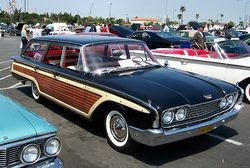Didn't sleep a whole lot though. Kept wondering throughout the country side if perhaps I hadn't made some sort of horrendous error in judgment (a suspicion confirmed less than 24 hours after enlisting, and then in some four years of consequences. . .)
 |
| The Quarterdeck Of The Navy! |
I found out this morning on Wikipedia that Great Lakes was known as "the Quarterdeck of the Navy." The quarterdeck on a ship, if I remember correctly, is the area where one first comes on board. How appropriate to designate Great Lakes with this honorific . . .
Great Lakes was also known by another, less honorable, but perhaps more accurate, honorific, one definitely much more appropriate for one such as I, and also one which I can't believe I never heard until this morning, in the same Wikipedia article-- it was also called "Great Mistakes . . ."
Uniforms were issued the second day, but in the next 8 weeks, I lost 25 pounds, so nothing fit by the time boot camp was over, when I would have only had three years and 44 weeks left until my enlistment was over, except that also during the first week, I had signed a two year extension so I could be guaranteed a slot at an extended electronics school (Fire Control Technician, for Polaris submarines!). By week three, I had come to realize my mistake, and begun to appreciate that sometimes the consequences of our decisions were far out of proportion to the decisions themselves . . .
In boot camp, because of my previous affiliation with the Catholic Church, I was designated as the "Catholic Religious Petty Officer." My nickname immediately became "Padre." On Sunday mornings, it was my job to march all the Catholics to church. Attendance was mandatory. Seems we still had freedom to worship, we just didn't have freedom to not worship anymore. And at church in boot camp, over the 8 weeks I was there, I ran into three other LaSalette alumni.
I learned a lot in boot camp. It was a lot like the seminary. We all got up at the same time, ate at the same time, did everything together, and all answered to the same higher authority. The major difference was the new vocabulary one used to describe everyday events and occurences . . .
I re-learned how to tie some of the same knots I'd learned in boy scouts. I learned the "general orders of a sentry." I learned how to make a flotation device out of my pants. And I learned how to march. Marching was my favorite-- it didn't take a lot of thought. After a while, I could do it in my sleep.
Boot camp ended in October, 1967, and we all got two weeks leave, that we hadn't earned yet. Which was fairly uneventful, until the night I asked my mom to pass the 'effin' butter. Then I reported back to Great Lakes to begin Fire Control Technician A School. Now I only had 5 years and 44 weeks until I would be a civilian again . . .


































